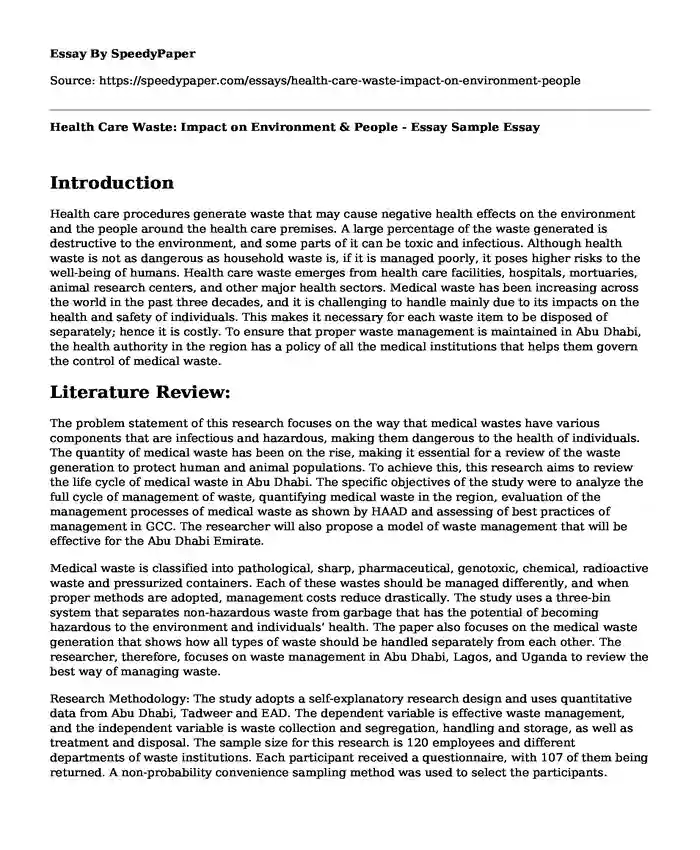
| Type of paper: | Essay |
| Categories: | Medicine Healthcare |
| Pages: | 3 |
| Wordcount: | 636 words |
Introduction
Health care procedures generate waste that may cause negative health effects on the environment and the people around the health care premises. A large percentage of the waste generated is destructive to the environment, and some parts of it can be toxic and infectious. Although health waste is not as dangerous as household waste is, if it is managed poorly, it poses higher risks to the well-being of humans. Health care waste emerges from health care facilities, hospitals, mortuaries, animal research centers, and other major health sectors. Medical waste has been increasing across the world in the past three decades, and it is challenging to handle mainly due to its impacts on the health and safety of individuals. This makes it necessary for each waste item to be disposed of separately; hence it is costly. To ensure that proper waste management is maintained in Abu Dhabi, the health authority in the region has a policy of all the medical institutions that helps them govern the control of medical waste.
Literature Review:
The problem statement of this research focuses on the way that medical wastes have various components that are infectious and hazardous, making them dangerous to the health of individuals. The quantity of medical waste has been on the rise, making it essential for a review of the waste generation to protect human and animal populations. To achieve this, this research aims to review the life cycle of medical waste in Abu Dhabi. The specific objectives of the study were to analyze the full cycle of management of waste, quantifying medical waste in the region, evaluation of the management processes of medical waste as shown by HAAD and assessing of best practices of management in GCC. The researcher will also propose a model of waste management that will be effective for the Abu Dhabi Emirate.
Medical waste is classified into pathological, sharp, pharmaceutical, genotoxic, chemical, radioactive waste and pressurized containers. Each of these wastes should be managed differently, and when proper methods are adopted, management costs reduce drastically. The study uses a three-bin system that separates non-hazardous waste from garbage that has the potential of becoming hazardous to the environment and individuals’ health. The paper also focuses on the medical waste generation that shows how all types of waste should be handled separately from each other. The researcher, therefore, focuses on waste management in Abu Dhabi, Lagos, and Uganda to review the best way of managing waste.
Research Methodology: The study adopts a self-explanatory research design and uses quantitative data from Abu Dhabi, Tadweer and EAD. The dependent variable is effective waste management, and the independent variable is waste collection and segregation, handling and storage, as well as treatment and disposal. The sample size for this research is 120 employees and different departments of waste institutions. Each participant received a questionnaire, with 107 of them being returned. A non-probability convenience sampling method was used to select the participants.
Conclusion
Waste is stored before being disposed of in six groups mainly Group A, B, C, D, E, and F. Each of these groups encompasses different types of waste and how each of them should be mixed with other types of waste to reduce the adverse effects that they may cause to the environment. Hospital wastes are in excess, and with no proper planning, management of the waste can be a difficult task. Abu Dhabi requires a change in its waste management processes, especially in the arrangement of best practices that waste handlers can adopt. Waste should be treated before it is disposed to avoid the adverse effects that it may have on public health and the environment. Different policy international laws and regulations exist, including the Stockholm convention, and Basel convention was useful in discussing policies that can be used to reduce the effects of waste management.
Cite this page
Health Care Waste: Impact on Environment & People - Essay Sample. (2023, Oct 14). Retrieved from https://speedypaper.net/essays/health-care-waste-impact-on-environment-people
Request Removal
If you are the original author of this essay and no longer wish to have it published on the SpeedyPaper website, please click below to request its removal:
- Essay Sample with a Cover Letter for Pharmacy Technician
- Essay Example: Health Goals Research
- Essay Sample: Social Factors That Contributed to the Spread of Ebola in Guinea
- Culturally Competent Care: Assessing Patient Beliefs for Improved Outcomes - Essay Sample
- Paper Example: Neurological Disorders Impair the Normal Functioning of the Brain.
- Essay Sample on COVID-19 Infections Among the Latino Community
- Essay on Green Gold: Unveiling the Medical, Economic, and Comparative Aspects of Marijuana Legalization
Popular categories




